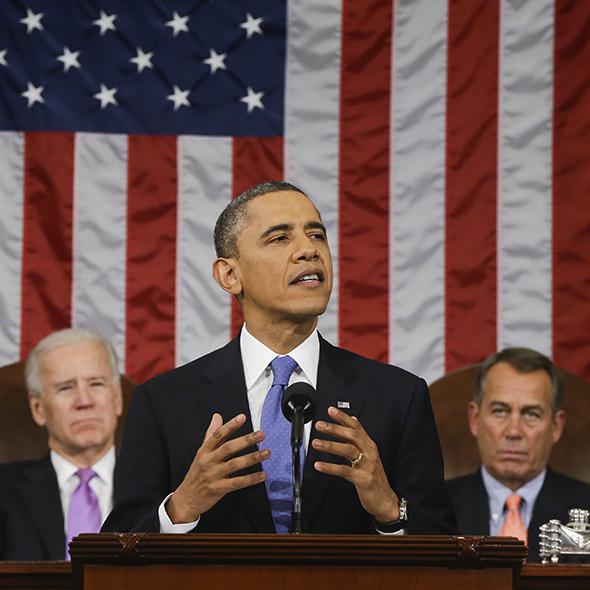The State of the Union is a huge waste of time. You have read this column before and you know exactly what is coming in the following lines. This is how rote and desolate this annual exercise has become. The speech is not only predictable and boring, but the pieces denouncing the speech are predictable and boring. So a plea for creativity! As you watch tonight, think about the creativity the president shows in making his arguments, illustrating his points, or in doing something new and different with a rhetorical form that so imprisons the president that the walk to the House podium now resembles a perp walk.
Why does creativity matter? Not to entertain, though that would be nice, but because one of the maladies of our current political system it is that we are stuck in old fights and old forms and old ways of thinking. Everyone plays to type and the cycle goes round and around. Even the prissy dismissiveness of those who refuse to attend the speech feels predictable.
So if a president can break out of the speech even in some small way, it might at least show a little life, generate a spark of conversation that could elevate things a bit. I am making an appeal to magical thinking, but if a president can’t be creative about this speech, there’s no chance he’ll be very creative about anything else. For presidents who want to show that they are in command of their office, they should grab the State of Union speech by the lapels and show it who’s boss. Turn it upside down, shake it, and wake people up a little. Perhaps treating a speech like it is an actual human is a little daffy, but studies show there is literally no human on the planet who will pine for the old way.
That a president can’t take the minimal risk and make the speech a little different is a signal of how imprisoning the office has become. And each year the imprisonment gets deeper. (Tonight the president may be approaching solitary confinement.) This White House is pushing out advisers through every possible medium—seating charts on Pinterest! photos of the speechwriter’s beard!—and carefully leaking details and engaging in all manner of frantic swirls of the blush wand to make the threadbare routine seem lively. This activity only highlights how exhausted the whole thing has become. (Unless, of course, this is a new kind of speech tonight, in which case: Bravo!)
The answer is not to go back to delivering the speech in written form as it was until Woodrow Wilson revived the practice after 112 years. There is still something to be said for the public gathering as a whole for a moment to discuss the problems that face us. The answer is to do something that captures the sense of moment, as described in this newspaper story recounting Wilson’s move to call the extraordinary joint session. “Washington is amazed,” it reads.
What if a president did what the governor of Vermont did a few weeks ago and dedicated his speech to a single topic? In Vermont the issue was heroin use, but for President Obama the issue could be income inequality. He has said that it is the one thing he wants to tackle for the remainder of his presidency. He’s straining to use every tool of the executive to combat it. One tool of the executive he could use (with his pen!) is to change the form of this speech. What if he were to say, “There are a lot of important challenges that we face and for my views on them you can visit the White House website—which still works!—but tonight I want to talk about the one single issue that should be our guiding star.”
That simple act of focus would be a 10-fold increase in creativity. At the very least it would cause the press to cover a single issue that the president says is important. Plus, to fill such a speech would require some story-telling and genuine acts of rhetoric to sustain his message from beginning to end. That would make it a speech worth listening to.
Tonight, as you listen, count how many words or sentences are wasted. Not that they aren’t’ important in some way, but are they important enough to call the whole country to the dinner table? If they’re not, maybe we should shelve the whole exercise until someone can come up with a form that injects a little whiff of the innovation, resilience, and creativity—qualities of the American spirit that are so often praised in the speech but rarely demonstrated by it.
